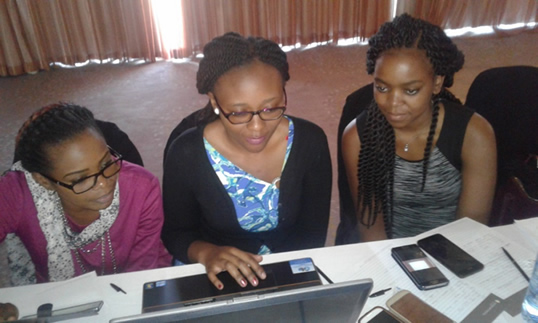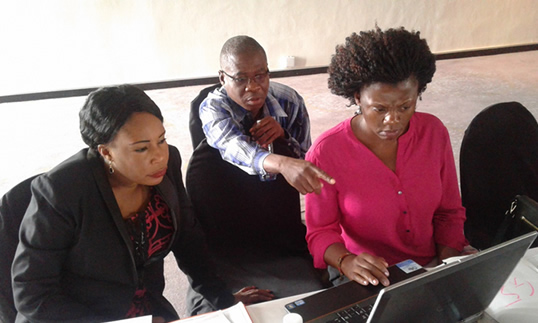- September 7, 2016
- Posted by: admin
- Categories: Current News, debt management, Debt Management

 MEFMI, jointly organized a regional workshop for Users and IT Administrators of the Debt Management and Financial Analysis System (DMFAS) with the United Nations Conference on Trade and Development (UNCTAD), from 15th to 24th August 2016 at Intercontinental Hotel, Lusaka, Zambia. A total of 33 officials from four (4) DMFAS User member states were trained, with female participants representing 45 percent of the total.
MEFMI, jointly organized a regional workshop for Users and IT Administrators of the Debt Management and Financial Analysis System (DMFAS) with the United Nations Conference on Trade and Development (UNCTAD), from 15th to 24th August 2016 at Intercontinental Hotel, Lusaka, Zambia. A total of 33 officials from four (4) DMFAS User member states were trained, with female participants representing 45 percent of the total.
The main objective of the workshop was to equip officials involved in the day-to-day operational functions of public debt management and database administration with the knowledge and skills to effectively use the DMFAS system, as well as provide technical support to the system.
The workshop was officially opened by Mrs. Pamela C. Kabamba, Permanent Secretary for Budgets and Economic Affairs at the Ministry of Finance, Zambia. In her opening remarks, Mrs. Kabamba commended MEFMI for prioritizing capacity building in the development and maintenance of sound macroeconomic and financial information needed by member states for in order to for policymakers, financial markets and other relevant stakeholders to make informed decisions. She noted that MEFMI’s collaboration with UNCTAD has empowered DMFAS user countries in the region to record and report on public debt and other sovereign contingent liabilities such as guarantees. As a result, governments are better able to measure, understand and manage sovereign debt cost and risks. She also commended UNCTAD for their continuous efforts in upgrading the system to ensure it keeps abreast of evolving public debt management practices, advances in technology and evolving user requirements.  UNCTAD’s DMFAS Quality Assurance and User Support Team Leader, Mrs Roula Kartegi, described MEFMI’s collaboration with UNCTAD as an example of a successful partnership in the development of human resources for sound public financial management in the region. She noted that MEFMI and UNCTAD have had a strong and longstanding relationship which facilitates coordinated interventions that contribute to the common goal of improving public debt management in the region.
UNCTAD’s DMFAS Quality Assurance and User Support Team Leader, Mrs Roula Kartegi, described MEFMI’s collaboration with UNCTAD as an example of a successful partnership in the development of human resources for sound public financial management in the region. She noted that MEFMI and UNCTAD have had a strong and longstanding relationship which facilitates coordinated interventions that contribute to the common goal of improving public debt management in the region.
As part of the programme design and to ensure that the workshop addressed evolving needs of client institutions, a pre-workshop survey was conducted to collect information directly from Users and Database/System Administrators of DMFAS on existing capacity gaps and training priorities for 2016. Results from this survey informed the design of a customized training programme and topics addressed during the workshop. This also assisted in ensuring that during the workshop participants upgraded their functional and technical skills in DMFAS. Those who attended the workshop are expected to effectively use the system in compiling, monitoring and analyzing public debt and other sovereign contingent liabilities such as guarantees in their respective offices and institutions.
During the workshop, Database Administrators learnt procedures for installing the oracle software, setting-up the database and application server, and the general technical support to the DMFAS. Participants shared their experiences in building up interfaces between DMFAS and other public financial management systems. Future development plans of DMFAS system was also discussed, with UNCTAD receiving feedback from user countries on their expectations/requirements in the new version. Finally, a number of participants proposed and supported an initiative for the creation of a forum that would allow for better sharing of experiences across the DMFAS User countries in the region, on how to overcome challenges and to learn from each other’s experiences.
One important lesson learnt is the need to conduct a pre-workshop survey to collect information directly from participating officials to inform the design of a customized training programme and topics to be addressed during the workshop. This will ensure that the workshop addresses evolving needs of client institutions and makes discussions very relevant to participants.
